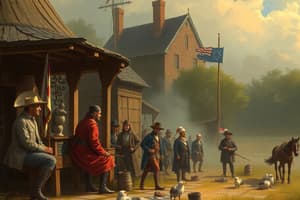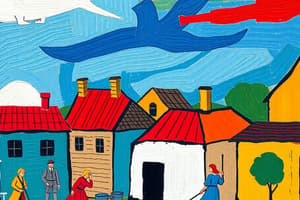Podcast
Questions and Answers
Who was John Calvin?
Who was John Calvin?
A French Protestant reformer who believed in predestination.
What was the Spanish Armada?
What was the Spanish Armada?
The Spanish navy of 130 ships.
What is a joint-stock company?
What is a joint-stock company?
A company where people invested their money and received a certificate showing their investment.
Name the first self-governing body in the New World.
Name the first self-governing body in the New World.
What is the difference between a royal colony and a proprietary colony?
What is the difference between a royal colony and a proprietary colony?
Who founded Rhode Island and why?
Who founded Rhode Island and why?
What was the Act of Toleration?
What was the Act of Toleration?
Who were the Pilgrims and what did they do?
Who were the Pilgrims and what did they do?
Georgia was the first of the 13 colonies to be settled.
Georgia was the first of the 13 colonies to be settled.
What are exports?
What are exports?
What is libel?
What is libel?
What was the Hornbook?
What was the Hornbook?
What is the difference between an indentured servant and a slave?
What is the difference between an indentured servant and a slave?
What is a primer?
What is a primer?
Who was John Peter Zenger?
Who was John Peter Zenger?
What was the Bay Psalm Book?
What was the Bay Psalm Book?
What was the New England Primer?
What was the New England Primer?
What were dame schools?
What were dame schools?
What was Pietism?
What was Pietism?
What was the Great Awakening?
What was the Great Awakening?
Who was George Whitefield?
Who was George Whitefield?
Who was Jonathan Edwards?
Who was Jonathan Edwards?
What was the difference between Old Lights and New Lights?
What was the difference between Old Lights and New Lights?
What was the name of the German immigrants residing in Pennsylvania?
What was the name of the German immigrants residing in Pennsylvania?
Who was the first person to be appointed a governor of Pennsylvania?
Who was the first person to be appointed a governor of Pennsylvania?
What was the primary reason for the Great Awakening?
What was the primary reason for the Great Awakening?
What role did Theodore Frelinghuysen have in the Great Awakening?
What role did Theodore Frelinghuysen have in the Great Awakening?
Who was David Brainerd?
Who was David Brainerd?
What were the main differences between the Quakers and the Baptists?
What were the main differences between the Quakers and the Baptists?
How did the Hornbook and the Primer differ?
How did the Hornbook and the Primer differ?
What are some examples of religious groups that were instrumental in America's early history?
What are some examples of religious groups that were instrumental in America's early history?
Flashcards
John Calvin
John Calvin
French Protestant reformer who believed in predestination.
Spanish Armada
Spanish Armada
Spanish navy of 130 ships.
Juan Ponce de Leon
Juan Ponce de Leon
Sailed from Puerto Rico to the Florida coast in search of gold and claimed the land for Spain.
Roger Williams
Roger Williams
Signup and view all the flashcards
Colony
Colony
Signup and view all the flashcards
Joint-Stock Company
Joint-Stock Company
Signup and view all the flashcards
Royal Colonies
Royal Colonies
Signup and view all the flashcards
House of Burgesses
House of Burgesses
Signup and view all the flashcards
Georgia
Georgia
Signup and view all the flashcards
Act of Toleration
Act of Toleration
Signup and view all the flashcards
Proprietary
Proprietary
Signup and view all the flashcards
Pilgrims
Pilgrims
Signup and view all the flashcards
Exports
Exports
Signup and view all the flashcards
Libel
Libel
Signup and view all the flashcards
Hornbook
Hornbook
Signup and view all the flashcards
John Peter Zenger
John Peter Zenger
Signup and view all the flashcards
Pennsylvania Dutch
Pennsylvania Dutch
Signup and view all the flashcards
Indentured Servants
Indentured Servants
Signup and view all the flashcards
Imports
Imports
Signup and view all the flashcards
Primer
Primer
Signup and view all the flashcards
New England Primer
New England Primer
Signup and view all the flashcards
Dame Schools
Dame Schools
Signup and view all the flashcards
Pietism
Pietism
Signup and view all the flashcards
Lutherans
Lutherans
Signup and view all the flashcards
George Whitefield
George Whitefield
Signup and view all the flashcards
Baptist Church
Baptist Church
Signup and view all the flashcards
Jonathan Edwards
Jonathan Edwards
Signup and view all the flashcards
Presbyterians
Presbyterians
Signup and view all the flashcards
Quakers
Quakers
Signup and view all the flashcards
Mennonites
Mennonites
Signup and view all the flashcards
Old Lights
Old Lights
Signup and view all the flashcards
Theodore Frelinghuysen
Theodore Frelinghuysen
Signup and view all the flashcards
Bay Psalm Book
Bay Psalm Book
Signup and view all the flashcards
David Brainerd
David Brainerd
Signup and view all the flashcards
Study Notes
Key Figures and Events in Early American History
- John Calvin: A French Protestant reformer who championed predestination.
- Spanish Armada: A formidable fleet of 130 Spanish ships.
- Juan Ponce de Leon: A Spanish explorer who claimed Florida for Spain, seeking gold.
- Roger Williams: A Puritan who left Massachusetts, founding Rhode Island due to disagreements with church authority.
- Colony: A settlement in a distant land, governed by the parent country.
- Joint-Stock Company: A business venture where investors pool funds for a common goal, receiving certificates reflecting their investment.
- Royal Colonies: Colonies governed directly by the English monarch.
- House of Burgesses: The first self-governing body in the New World, established in Jamestown.
- Georgia: The last of the thirteen colonies to be settled.
- Act of Toleration: A declaration granting religious freedoms to all Christians within a region.
- Proprietary Colonies: Colonies governed by an individual appointed by the king.
- Pilgrims: English Christians who founded Plymouth Colony in 1620, seeking religious freedom.
- Exports: Goods sold to foreign countries.
- Libel: Publishing false statements harmful to a person's reputation.
- Hornbook: An early educational tool, featuring the alphabet and Lord's Prayer.
- John Peter Zenger: A New York newspaper publisher who challenged censorship in 1730.
- Pennsylvania Dutch: German immigrants residing in Pennsylvania.
- Indentured Servants: Individuals who contracted to work without pay for a specified period in exchange for passage to America.
- Imports: Goods brought into a country.
- Primer: A basic reading book for young children, following the hornbook.
- New England Primer: A widely used primer promoting grammar, vocabulary, moral lessons, and catechisms.
- Dame Schools: Village schools in New England, primarily for boys and girls, taught by women such as widows or the village minister.
- Pietism: A 17th-century German religious movement emphasizing personal holiness.
- Lutherans: Followers of Martin Luther's teachings.
- George Whitefield: A prominent English preacher who sparked a religious revival in the colonies.
- Baptist Church: A church founded in 1639 in Rhode Island, largely due to the work of Roger Williams and others.
- Jonathan Edwards: A key theologian of the Great Awakening, important in American history.
- Presbyterians: A branch of English separatists.
- Quakers: A religious group led by George Fox, emphasizing inner guidance.
- Mennonites: Followers of Menno Simons, a Dutch religious leader.
- Old Lights: Presbyterians who opposed the emotional fervor of the Great Awakening.
- Theodore Frelinghuysen: A Dutch pastor who stressed Christian living and conversions.
- Bay Psalm Book: A collection of Puritan hymns published in 1640.
- David Brainerd: A missionary known for inspiring others to work in missionary efforts with Native Americans.
Economic Terms
- Exports: Goods sold to other countries
- Imports: Goods brought in from other countries
Studying That Suits You
Use AI to generate personalized quizzes and flashcards to suit your learning preferences.




